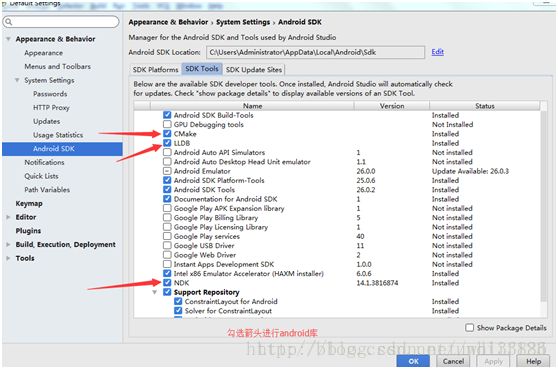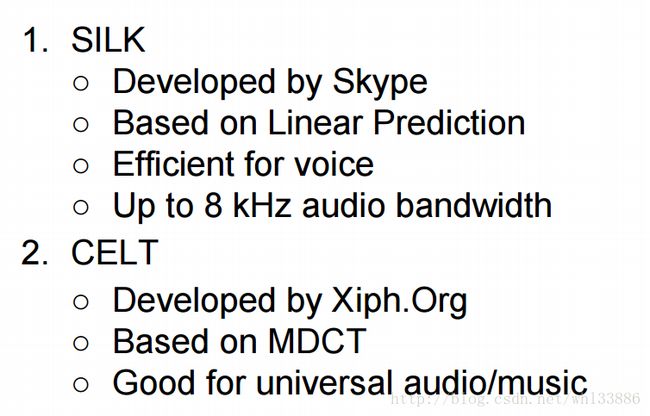Unity 工具-Opus音频压缩(安卓篇)
现在很多游戏开始注重社交,因此语音成了游戏中不可或缺的部分。很多公司由于各种限制,可能使用第三方的SDK。虽然方便使用,但是费用挺高,而且不开源,不方便控制细节。
Opus编码器 是一个有损声音编码的格式,由互联网工程任务组(IETF)近来开发Opus 格式是一个开放格式,使用上没有任何专利或限制,应该算是Speex的升级吧,在压缩质量和效率上有了很大的提升。
具体的对比:官网对比说明
在Unity中使用Opus,首先要自己编译成对应Win、Android、IOS的支持库,网上关于Win和Android的网上有很多。我是自己写了简单的接口函数,然后分别对应编译成.dll、.so和.o,导入到Unity中用C#调用。(过去没有接触过编译,因此说的都是入门的,可能有些也不对,大神可以不用看下面的)
其中有几个坑:
- Opus源码在Win有对应的解决方案,因此直接VS打开就可以,写完接口函数,直接编译就好,但是如果编译IOS,就需要自己新建工程,然后导入Opus源码,注意只导入C文件和头文件,其他的都不要导进去,并且所有的X86文件夹都不要导入,IOS只有ARM的CPU。
- IOS必须在真机上测试,Unity中不能调用静态库。
- 安卓的是按照网上的教程,使用NDK编译,感觉很好用,写好MK,就不用管了,我只把接口函数写入,它会自动将以来的方法编译进去。
其中安卓的编译,参考 前人的经验,接口函数不同,需要写C#调用的,而不是JAVA
1.打开android studio,点击sdk-manager->android sdk勾选红色箭头进行安装ndk等库,ndk需要设置一下环境变量,设置后cmd就可以直接编译了。

2.下载Opus_1.1.4 解压后把本文件名命名jni,celt_headers.mk,celt_sources.mk,opus_headers.mk,opus_sources.mk,silk_headers.mk,silk_sources.mk 把这mk放在jni同级目录中
3.配置android.mk
其中LOCAL_SRC_FILES := opusmain.cpp\ #封装接口opusmain.cpp
接口文件按照自己写的改,而且要写成可以C#访问的,而不是JAVA,网上的很多都只是Android使用,要自己写接口函数。
LOCAL_PATH := $(call my-dir) #加载当前路径
include $(CLEAR_VARS)
include celt_sources.mk #加载celt 所有.c的 mk
include silk_sources.mk #加载silk 所有.c 的mk
include opus_sources.mk #加载opus 所有.c 的mk
MY_MODULE_DIR := newopus #库的名称
LOCAL_MODULE := $(MY_MODULE_DIR)
SILK_SOURCES += $(SILK_SOURCES_FIXED)
#编译的源代码.c
CELT_SOURCES += $(CELT_SOURCES_ARM)
SILK_SOURCES += $(SILK_SOURCES_ARM)
LOCAL_SRC_FILES := opusmain.cpp\ #封装接口opusmain.cpp
$(CELT_SOURCES) $(SILK_SOURCES) $(OPUS_SOURCES)
LOCAL_LDLIBS := -lm –llog #加载系统的库 日志库
LOCAL_C_INCLUDES := \ #包含头文件
$(LOCAL_PATH)/include \
$(LOCAL_PATH)/silk \
$(LOCAL_PATH)/silk/fixed \
$(LOCAL_PATH)/celt
#附加编译选项
LOCAL_CFLAGS := -DNULL=0 -DSOCKLEN_T=socklen_t -DLOCALE_NOT_USED -D_LARGEFILE_SOURCE=1 -D_FILE_OFFSET_BITS=64
LOCAL_CFLAGS += -Drestrict='' -D__EMX__ -DOPUS_BUILD -DFIXED_POINT=1 -DDISABLE_FLOAT_API -DUSE_ALLOCA -DHAVE_LRINT -DHAVE_LRINTF -O3 -fno-math-errno
LOCAL_CPPFLAGS := -DBSD=1
LOCAL_CPPFLAGS += -ffast-math -O3 -funroll-loops
include $(BUILD_SHARED_LIBRARY) #编译动态库设置其中include celt_sources.mk include silk_sources.mk include opus_sources.mk为官方自带的MK,里面有需要的编译规则,cilt主要处理音乐,silk处理声音(skype开发)

4.配置Application.mk
APP_ABI := armeabi armeabi-v7a #编译运行的系统,平台
NDK_TOOLCHAIN_VERSION=4.9 #指定交叉编译器
APP_PLATFORM := android-19 #设定ndk编译的版本5.接口函数
头文件opusmain.h
int frame_size;
int channels = 1;
opus_int32 opus_num;
opus_int32 pcm_num;
float* pcm_dataFloat_encoder = NULL;
opus_int16* pcm_dataInt_encoder = NULL;
unsigned char* opus_dataInt_decoder = NULL;
unsigned char* opus_dataFloat_decoder = NULL;
OpusEncoder *enc = NULL;
OpusDecoder *dec = NULL;
int error;
//必须带有extern "C",否则在Unity中找不到以下方法
extern "C" {
int nMyOpus;
int fnMyOpus(void);
void opusEncoderInit(int Fs, int _channels);
void opusEncoderSet(int _frame_size, bool isFloat, int quality, int signal);
void opusDecoderInit(int Fs, int _channels, int max_len, bool isFloat);
int opusEncoder(opus_int16 *encoder_insrc, int in_offset, unsigned char *encoder_out, int max_len);
int opusDecoder(int len, unsigned char *decoder_insrc, int in_offset, opus_int16 *decoder_out);
int opusEncoderFloat(float *encoder_insrc, int in_offset, unsigned char *encoder_out, int max_len);
int opusDecoderFloat(int len, unsigned char *decoder_insrc, int in_offset, float *decoder_out);
void opusEncoderDispose();
void opusDecoderDispose();
}C++文件opusmain.cpp
#include 编译过程很简单
进入到Opus文件夹,在里面打开命令行,输入ndk-build,就可以,他会自动找到MK文件,并按规则编译。
在生成Lib文件夹,在里面就能找到.so文件
安卓的先到这,IOS和Win的,以及Unity怎么使用,在下篇博客